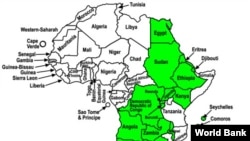A senior official at the Common Market for Eastern and Southern Africa (COMESA) says the organization is encouraged by an agreement between heads of state from Uganda, The Democratic Republic of Congo (DRC) and Ethiopia to join the group’s free trade program, a decision taken at the just-concluded summit.
The heads of state and government that attended the COMESA summit, which ended Thursday, in the DRC capital, Kinshasa, include Joseph Kabila, Michael Sata, Yoweri Museveni, Joyce Banda, Robert Mugabe, Omar Hassan Al-Bashir and Ismail Omar Guelleh.
Francis Mangeni, director for trade at COMESA, says the region’s relative peace and stability has led to a sharp increase in business activities, which he says could attract foreign investment.
“Peace and security in the region has improved and we are happy about that. Conflicts in Congo are almost resolved, the M23 has been defeated. So the security situation is very good and this is very important for investment,” says Mangeni.
Officials say the heads of state discussed the status of the implementation of the COMESA Free Trade Area and progress on the implementation of the COMESA Customs Union.
“The three countries that have agreed to join the COMESA Free Trade Area by December this year are Uganda, Ethiopia and Congo DR, the host country. Congo DR and Ethiopia are large economies so this is really good news for us,” says Mangeni.
“Overall we have got some good outcomes and we need to now implement these decisions over this year so by the time of the next summit, we will have something to report to the [leaders].”
Observers say implementation of agreements at such summits is often weak, despite proposed solutions to resolve problems the entire continent faces. Mangeni acknowledged Africa needs to do more to resolve its challenges.
He says the regional group has established a measure it calls “domestication” in a bid to ensure decisions and agreements signed at the Kinshasa summit are fully implemented.
“We have got clear pronouncement from heads of state…that this is a number one priority and they will make sure they will do everything possible at the national level in terms of enacting national laws, putting in place the required institutions and polices to ensure that what they have adopted at the COMESA level is translated into national laws and there are national institutions to implement them,” says Mangeni.
Some analysts say pockets of violence in Sudan, DRC, Somalia and other countries could undermine COMESA’s efforts to attract foreign investors.
But, Mangeni says the group has implemented mechanisms to help resolve the conflicts. He also says there is an upsurge in business activities.
“The message to investors is things are improving,” says Mangeni. “Business is booming in COMESA and the statistic that we like to cite is trade in goods has risen from $3.1 billion in the year 2000 to $19.3 billion at the moment. If you look at the trajectory, the rate of growth, the potential is really good for investors that come to Africa.”
The heads of state and government that attended the COMESA summit, which ended Thursday, in the DRC capital, Kinshasa, include Joseph Kabila, Michael Sata, Yoweri Museveni, Joyce Banda, Robert Mugabe, Omar Hassan Al-Bashir and Ismail Omar Guelleh.
Francis Mangeni, director for trade at COMESA, says the region’s relative peace and stability has led to a sharp increase in business activities, which he says could attract foreign investment.
“Peace and security in the region has improved and we are happy about that. Conflicts in Congo are almost resolved, the M23 has been defeated. So the security situation is very good and this is very important for investment,” says Mangeni.
Officials say the heads of state discussed the status of the implementation of the COMESA Free Trade Area and progress on the implementation of the COMESA Customs Union.
“The three countries that have agreed to join the COMESA Free Trade Area by December this year are Uganda, Ethiopia and Congo DR, the host country. Congo DR and Ethiopia are large economies so this is really good news for us,” says Mangeni.
“Overall we have got some good outcomes and we need to now implement these decisions over this year so by the time of the next summit, we will have something to report to the [leaders].”
Observers say implementation of agreements at such summits is often weak, despite proposed solutions to resolve problems the entire continent faces. Mangeni acknowledged Africa needs to do more to resolve its challenges.
He says the regional group has established a measure it calls “domestication” in a bid to ensure decisions and agreements signed at the Kinshasa summit are fully implemented.
“We have got clear pronouncement from heads of state…that this is a number one priority and they will make sure they will do everything possible at the national level in terms of enacting national laws, putting in place the required institutions and polices to ensure that what they have adopted at the COMESA level is translated into national laws and there are national institutions to implement them,” says Mangeni.
Some analysts say pockets of violence in Sudan, DRC, Somalia and other countries could undermine COMESA’s efforts to attract foreign investors.
But, Mangeni says the group has implemented mechanisms to help resolve the conflicts. He also says there is an upsurge in business activities.
“The message to investors is things are improving,” says Mangeni. “Business is booming in COMESA and the statistic that we like to cite is trade in goods has risen from $3.1 billion in the year 2000 to $19.3 billion at the moment. If you look at the trajectory, the rate of growth, the potential is really good for investors that come to Africa.”





